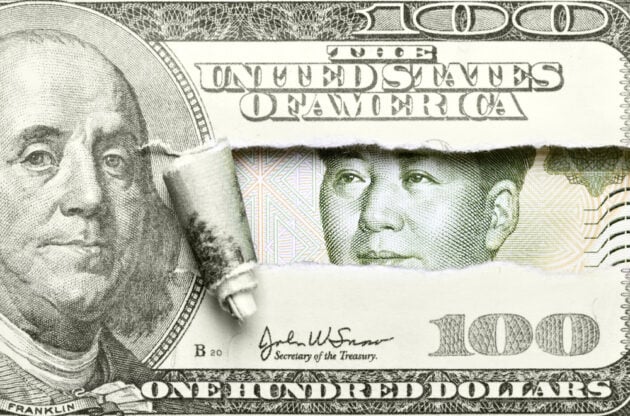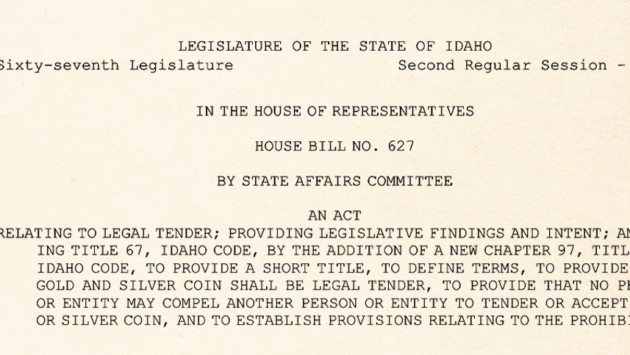
On March 29, China and Brazil agreed to ditch the dollar and settle their bilateral transactions in their local currencies — reals and yuan.
This historic agreement is one of the latest developments in a rising global trend toward de-dollarization lead by a coalition of five countries: Brazil, Russia, India, China and South Africa (also named ”BRICS”).
Since 2001, the BRICS coalition has been discussing a move away from US dollar hegemony. But until recently, it was all talk and no action.
Now, the global movement to de-dollarize appears to be gaining traction fast.
At this point, Argentina, Turkey, Indonesia, Iran, Mexico, Saudi Arabia, Egypt and the United Arab Emirates have applied for membership or stated their desire to join the BRICS de-dollarization coalition.
Which means about half the world’s economy is trying to end its dependence on the US dollar
This is a critical shift in the global financial system. And some analysts believe it may signal the beginning of the end for the greenback’s 79-year run as the world’s dominant currency.
Why is this happening?
Well, international confidence in the dollar began to erode after the 2008 global financial crisis, which was blamed on the actions of US banks. And it’s no secret that resentment against Washington’s “weaponization” of the US dollar when it did not like the actions of countries working against US interests has been building for some time.
But now, the de-dollarization initiative may have been energized by sweeping US sanctions against Russia last February following the invasion of Ukraine.
At the same time, tensions between the US and China may have added fuel to the fire. And The Wall Street Journal reports China “has become an important economic lifeline for Russia…”
Last month, Xi Jinping and Vladimir Putin met in Moscow to discuss a strategic economic alliance. And according to The Council on Foreign Relations, Putin has agreed to use China’s yuan, not the US dollar, “in trade with the Global South to diminish the role of the U.S. dollar in world trade.”
Fox News reported on the event, saying the two “sent an ominous message to the west during their 3-day summit” and “they are looking to undermine the U.S. dollar.”
And that may be exactly what’s happening
Because Xi Jinping has called for payments for Chinese oil and gas imports to be made in yuan. And Saudi Arabia’s finance minister, Mohammed Al-Jadaan, says the country is open to the possibility for the first time in 48 years.
Further – Saudi Arabia and Iran are in talks to form an economic alliance with China and Russia. And both may soon be formally admitted into BRICS.
What impact could this have on the global economic system?
Former Assistant Treasury Secretary Monica Crowley told Fox News she believes “it’s really hard to overstate how catastrophic the abandonment of the US dollar would be as the world’s global reserve currency.”
She went on to say, “We’ve got America’s enemies, led by China, forming a new economic block…,” and, if Saudi Arabia prices oil in other currencies, it could trigger “a complete implosion of the global economic system…”
Is that possible?
Well, the situation is quite complex.
And no official source has offered definitive answers yet.
But all of this happening against a backdrop of waning confidence in the US financial system, the impact of inflation on global markets, the impact of US money printing on the purchasing power of the dollar and the recent shocking bank failures…
… paints a murky picture for the dollar’s reserve status.
And it’s not hard to understand why the world’s nations are assessing the risks of holding and trading in our currency.
But this may only be the opening chapter of the emerging de-dollarization story…
Because central banks around the world are not only diversifying away from the dollar but also hedging their bets by purchasing massive amounts of gold.
In January, China added another 15 tons of gold to its reserves. And according to China Daily “Dong Dengxin, director of Wuhan University of Science and Technology’s Finance and Securities Institute, said it will be sensible for China to further cut US debt holdings but boost gold reserves to diversify reserve assets, given that the abuse of the dollar in financial sanctions has impaired the greenback’s credibility as a reserve currency.”
And Reuters says, “Russia’s central bank has increased its holdings of gold by one million troy ounces since the start of the war in Ukraine.”
This means the leaders of the BRICS coalition are buying huge amounts of gold while decoupling from the dollar.
So, how will this all impact working Americans?
At this point, it’s a matter of debate. But there’s no doubt the possible fall of the US dollar as the world’s reserve currency may have challenging implications in the future.
Right now, as inflationary pressures continue to squeeze US consumers, many Americans are already tapping into their savings to make ends meet. And all investments tied to the US dollar — including stocks and bonds in 401(k)s and IRAs — may lose value if the dollar bottoms out.
This is a big reason why we’re seeing so many Americans turning to gold to help secure their financial futures. Because gold has long been considered a trusted hedge against inflation and currency devaluation. And with BRICS leading the charge toward ditching the dollar internationally, and the historically large acquisitions of gold by global central banks, gold may play an increasingly important role in a post-dollar world.
As you’ve surely seen, the price of gold has already begun to rise as investors look to protect their wealth against the uncertain economic outlook.
Barron’s reports gold has “less than 1.5% to rise to hit its record high of $2,069.40 set in 2020.”
And from where I’m sitting, all of this points to one inescapable conclusion:
There may have never been a better time in history to own gold. And if you haven’t already, it may be time to consider shifting part of your savings into a Gold IRA.
————————–
If you want to learn more about protecting your savings with gold, click here to get a FREE Gold Information Kit or dial toll-free 888-529-0399 now to speak with a Gold Specialist and get all your questions answered. There’s no cost and no obligation.



